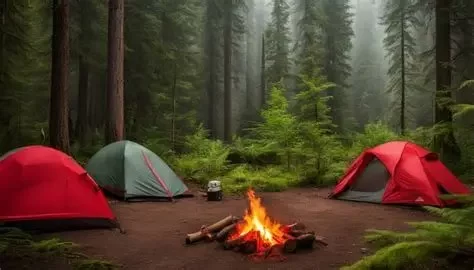Discover how to prepare for a wildfire while RV camping. Learn essential safety tips, evacuation strategies, and gear recommendations to stay safe with Pine Cliff Resort.

- why-wildfire-prep-matters-for-rv-campers - Why Wildfire Prep Matters for RV Campers
- pre-trip-research-and-readiness - Pre-Trip Research and Readiness
- essential-supplies-to-pack-for-fire-readiness - Essential Supplies to Pack for Fire Readiness
- on-site-safety-and-fire-risk-awareness - On-Site Safety and Fire Risk Awareness
- creating-an-evacuation-plan-for-your-rv-group - Creating an Evacuation Plan for Your RV Group
- real-experience-what-one-camper-learned-the-hard-way - Real Experience: What One Camper Learned the Hard Way
- why-pine-cliff-resort-is-your-safe-camping-choice - Why Pine Cliff Resort Is Your Safe Camping Choice
1. Why Wildfire Prep Matters for RV Campers
RV camping offers the joy of freedom and exploration, but it also comes with the responsibility to prepare for environmental hazards—wildfires being one of the most unpredictable and dangerous. In many parts of the U.S., wildfire season can turn a peaceful vacation into a life-threatening situation within minutes. That’s why understanding how to prepare for a wildfire while RV camping is not optional—it's vital for your safety and peace of mind.
2. Pre-Trip Research and Readiness
2.1 Check Fire Danger Ratings Before You Travel
Before you even pack your RV, check the local wildfire danger rating. Government sites like InciWeb or state forestry departments provide real-time fire maps and warnings. If your destination is at high risk, consider rescheduling or choosing a safer alternative.
2.2 Understand Local Evacuation Routes
Make sure you know at least two evacuation routes from your chosen camping location. GPS apps may not always update in real-time during a crisis, so it's smart to print physical maps as a backup.
2.3 Prepare Your Vehicle
Ensure your RV is mechanically sound, fully fueled, and has a spare tire. In wildfire scenarios, fast, reliable movement is critical. Also, pack lightweight ramps if your rig requires them to exit steep trails quickly.
3. Essential Supplies to Pack for Fire Readiness
3.1 Smoke Protection Gear
Packing N95 masks or reusable smoke-filtering respirators can protect you from inhaling harmful particles. Smoke can spread far beyond the fire zone, especially in valleys and low-pressure systems.
3.2 Emergency Go-Bag
Keep an accessible bag with essentials: water, food bars, flashlight, battery charger, important documents, pet supplies, and a basic first-aid kit. Each member of your camping group should know where it is.
3.3 Fire Extinguishers and Fire Blankets
Have at least two fire extinguishers rated for Class A/B/C fires in your RV and a fire blanket accessible inside your sleeping area. These tools are essential in case you encounter small flare-ups or roadside embers.
4. On-Site Safety and Fire Risk Awareness
4.1 Choose Your Campground Wisely
Camp in cleared areas with minimal dry brush, ideally near a water source or gravel clearing. Avoid camping directly under trees or near large boulder clusters where smoke can become trapped.
4.2 Establish a 30-Foot Fire Perimeter
Clear a 30-foot buffer zone around your RV of pine needles, twigs, dry leaves, and other flammable debris. This gives your vehicle a fighting chance if embers land nearby.
4.3 Monitor Weather and Air Quality
Use weather apps with alert features like Windy or NOAA Weather Radar to get alerts about changing wind directions or incoming fire threats. Sudden weather shifts can turn a minor fire into a deadly blaze.
5. Creating an Evacuation Plan for Your RV Group
5.1 Assign Roles Ahead of Time
If you're traveling with others, assign roles: who grabs what, who drives, who checks headcount. Having a plan prevents panic. Practice a drill at least once before settling in.
5.2 Stay Connected With Emergency Services
Download state-specific fire apps or use a CB radio to stay connected. Cell signals may be spotty during an emergency, and having multiple communication channels is a game-changer.
6. Real Experience: What One Camper Learned the Hard Way
Last summer, a family at a remote campground near Redding, California, faced a wildfire that ignited from a lightning strike. Despite being miles from the initial fire, wind carried embers across dry brush toward their RV. Because they'd previously rehearsed their evacuation plan and kept their rig packed and fueled, they were able to leave within 8 minutes. “We lost a chair and a few belongings,” they later recalled, “but we didn’t lose each other.” That story could've ended differently had they not been prepared.
7. Why Pine Cliff Resort Is Your Safe Camping Choice
When you're looking for a scenic yet secure camping spot, Pine Cliff Resort is your best bet. Our grounds are managed with wildfire safety in mind—firebreaks are maintained, staff are trained in emergency response, and local conditions are continuously monitored. Whether you're a solo adventurer or a family in a Class A rig, you’ll find both beauty and peace of mind here. Planning your next trip? Come stay at Pine Cliff Resort, where safety and serenity meet the great outdoors.
Swan Lake Resort & Campground
17463 Co Rd 29, Fergus Falls, MN 56537, USA
Visit Location PageJohn T Hatfield Campground (Seasonal)
137 N 850 E, Greenfield, IN 46140, USA
Visit Location Page